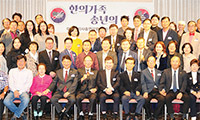▶ LENS
Video clips of frustrated Americans, many of them white and reasonably well off, shouting at their representatives over the proposal to institute some form of national health care has been inundating American cable news over the last few weeks.
The Hondurans behind the coup that ousted President Manuel Zelaya last month plotted their overthrow in the salons of the country’s more comfortable homes. They were worried about the populist path that President Zelaya was pursuing, Ginger Thompson reported in the Times.
Armida Villela de Lopez Contreras, a lawyer and former vice president, helped organize the protests that led to tens of thousands marching on Congress.
“The poor have always protested, and the rich always speak their minds, but the middle class never protested until now,” Ms. Lopez Contreras told Ms. Thompson. “It was as if Honduras woke up.”
The normally docile Japanese rural voter is losing faith, tired of government corruption and an economy mired in a slump. Though they have supported Liberal Democrats for office in every election except one in the last 55 years, Martin Fackler reported in The Times, polls show the party is heading for a humiliating loss in national elections on August 30.
“The countryside is angry,” said Takayuki Miyauchi, 67, a retired postmaster, told Mr. Fackler. “We want anyone but the Liberal Democratic Party.”
The proposal to overhaul the American health care system seemed to awaken a deep well of anger among Republicans, now feeling left out of a government their party controlled for many years. There were noisy demonstrations that led to fistfights, arrests and hospitalizations, The Times reported.
“This is about dismantling this country,” Katy Abram, 35, shouted at Senator Arlen Specter of Pennsylvania, in an exchange reported by The Times’s Ian Urbina and Katharine Q. Seelye. “We don’t want this country to turn into Russia.”
This method of “debating” may be seen as a path back to power.
“This isn’t just about health care,” Carolyn Doric of Harrisburg, Pennsylvania, told Mr. Urbina and Ms. Seelye. “It’s about power and a means to regain political power.”
Perhaps even more detrimental to democracy than anger is apathy. That was the sentiment among many educated Afghans as the presidential vote on Thursday approached, Hassana Sherjan wrote in an essay in The Times.
Ms. Sherjan, who is the director of Aid Afghanistan for Education, said one of her colleagues had discussed the election with 10 friends and the group decided not to vote. Their complaints include a dissatisfaction with the candidates, the lack of security and the role of foreign aid groups. “The election is a mere formality,” Ms. Sherjan’s colleague said.
But when it comes to democracy, screaming at lawmakers is healthier than giving up on them.
For comments, write to nytweekly@nytimes.com.
스마터리빙
more [ 건강]
[ 건강]이제 혈관 건강도 챙기자!
[현대해운]우리 눈에 보이지 않기 때문에 혈관 건강을 챙기는 것은 결코 쉽지 않은데요. 여러분은 혈관 건강을 유지하기 위해 어떤 노력을 하시나요?
 [ 건강]
[ 건강]내 몸이 건강해지는 과일궁합
 [ 라이프]
[ 라이프]벌레야 물럿거라! 천연 해충제 만들기
 [ 건강]
[ 건강]혈압 낮추는데 좋은 식품
[현대해운]혈관 건강은 주로 노화가 진행되면서 지켜야 할 문제라고 인식되어 왔습니다. 최근 생활 패턴과 식생활의 변화로 혈관의 노화 진행이 빨라지고
사람·사람들
more
LA 러너스클럽 새해맞이 등반 행사
LA 러너스클럽(회장 대니얼 임)은 지난 1일 새해맞이 그리피스팍 등반 행사를 가졌다. 이날 회원 30여 명은 쏟아지는 비 속에서도 그리피스팍…

미주한의사총연 송년행사
미주한의사총연합회(회장 조본환·이사장 서영수) 송년회가 지난달 14일 LA 옥스포드 팔레스 호텔에서 열렸다. 이날 행사에서는 프란시스코 김 캘…
[인터뷰-문경환 한인회장] “캔자스, 이민자들에 … 1
“캔자스시티는 삶의 속도와 기회의 균형이 잘 맞는 도시입니다. 제2의 인생을 시작하기에 더없이 좋은 곳이죠.”29일 본보를 방문한 문경환(61…
일사회 창립 14주년 기념식 및 송년행사
전·현직 민주평통자문위원들의 모임인 일사회(회장 박철웅)는 지난 16일 용수산에서 창립 14주년 기념식 및 송년회를 개최했다. 이날 행사에는 …
LA평통 통일전략분과 상견례
LA 평통(회장 장병우) 통일전략분과(위원장 이정현)는 지난 27일 형제갈비에서 상견례 겸 간담회를 개최했다. 이날 모임에서는 위원 간 교류를…
많이 본 기사
- 마두로 축출에 갈라진 지구촌… “국제법 위반” vs “환영”
- 트럼프, 베네수엘라 전격 군사작전… 마두로 ‘축출’
- 캘리포니아 ‘직장 내 권리 알림법’ 시행 돌입
- 가주 DMV 리얼 ID 발급 ‘전산 오류’
- [마두로 체포 막전막후] ‘델타포스’ 침투 5분만에 전광석화 체포… 은신처 대피 못해
- 연방 항소법원 “총기 공개적 휴대 금지 가주법 위헌”
- 황희찬 ‘PK 1골+1도움’… 울버햄프턴, 개막 20경기 만에 첫 승
- ‘국민 배우’ 안성기 별세 혈액암 투병, 향년 74세
- ‘브라운 50점’ 보스턴, 클리퍼스 꺾고 3연승
- LAX 또 항공편 대거 취소·지연 사태
- 한인타운 인근 상가서 묻지마 총격 2명 사상
- 입국 제한 확대… 추가 20개국 이민 신청 전면 중단
- “트럼프 폭주… 달러 패권 흔들”
- 일본프로야구 홈런왕 오카모토 토론토와 4년 6천만달러 계약
- 역대 최고령 45세 윌리엄스 호주오픈 여단식 본선 출전
- LA 총영사관 시무식… “민원 서비스 강화”
- LA 평통 내일 시무식
- Crinks 세력이 크게 꺾이는 그런 해가…
- 30년 모기지, 최저치 6.15%로 지난해 마감
- 소비자들 지갑 열까?… 올해 소비 전망 대체로 ‘양호’
- LA 러너스클럽 새해맞이 등반 행사
- [부음] 오동균 장로
- [이민법 칼럼] 시민권 박탈
- 재정보조만으로 부족한 대학 학비… 장학금 신청으로 해결
- 셀트리온, 미 뉴저지 생산시설 인수… CDMO 영토 넓힌다
- 가주 ‘억만장자세’ 추진… 파문 확산
- 오픈AI, 직원 주식보상도 ‘역대급’
- 하늘길 막은 ‘불청객’… 인천공항 운항 피해 5년새 107건
- 뉴욕증시, 새해 첫 거래 혼조세 마감
- 지표 보면 경제 알 수 있다… 경기 향방 가늠 10대 지표
- 백화점 ‘삭스피프스’… ‘챕터11’ 보호신청 검토
- [재계 주요 그룹 총수 신년사] “불확실성의 일상화… 빠른 결단·선제적 대응이 열쇠”
- “올해 도약 원년”… 토종 AI유니콘, 글로벌 시장 정조준
- 국회·세종 청사·항만 노출… ‘안티드론’ 구축률 10%도 안 돼
- 2026년 새해 계획
- [신년 집중기획/2026 새해 이렇게 바뀐다] 이민 제도 5대 변화… 영주권자까지도 입국시 안면인식 생체정보 수집
- [데이빗 이그나티우스 칼럼] 신년맞이 퀴즈: 2026년에는 좋은 일이 있을까?
- 시간이 머무는 곳
- Art Major -Beyond the Canvas
- [만화경] 집권 2년 차 징크스
- “미, 상호관세 부과 능력 계속 유지해야”
- 보류는 끝이 아닌 ‘다시 뛰기 위한 준비시간’
- “재정보조금이 대학의 NPC결과와 차이가 나는 이유”
- “올해도 미 성장 지속… S&P 500 두 자릿수↑”
- 가주, 개인정보 보호법 ‘초강수’
- 60년 만 ‘투자 귀재’ 없는 첫 주
- 메디케이드 정보 이민국 공유 ‘허용’
- 급조된 노력으론 명문대 힘들어… ‘새해부터 준비할 일’
- 현대차·기아·제네시스… 2025년 판매 역대 최다
- AI 시대에 제안하는 학부모님들을 위한 새해 결심
1/5지식톡

-
 미 육군 사관학교 West Poin…
0
미 육군 사관학교 West Poin…
0https://youtu.be/SxD8cEhNV6Q연락처:wpkapca@gmail.comJohn Choi: 714-716-6414West Point 합격증을 받으셨나요?미 육군사관학교 West Point 학부모 모…
-
 ☝️해외에서도 가능한 한국어 선생님…
0
☝️해외에서도 가능한 한국어 선생님…
0이 영상 하나면 충분합니다!♥️상담신청문의♥️☝️ 문의 폭주로 '선착순 상담'만 진행합니다.☎️ : 02-6213-9094✨카카오톡ID : @GOODEDU77 (@골뱅이 꼭 붙여주셔야합니다…
-
 테슬라 자동차 시트커버 장착
0
테슬라 자동차 시트커버 장착
0테슬라 시트커버, 사놓고 아직 못 씌우셨죠?장착이 생각보다 쉽지 않습니다.20년 경력 전문가에게 맡기세요 — 깔끔하고 딱 맞게 장착해드립니다!장착비용:앞좌석: $40뒷좌석: $60앞·뒷좌석 …
-
 식당용 부탄가스
0
식당용 부탄가스
0식당용 부탄가스 홀세일 합니다 로스앤젤레스 다운타운 픽업 가능 안녕 하세요?강아지 & 고양이 모든 애완동물 / 반려동물 식품 & 모든 애완동물/반려동물 관련 제품들 전문적으로 홀세일/취급하는 회사 입니다 100% …
-
 ACSL 국제 컴퓨터 과학 대회, …
0
ACSL 국제 컴퓨터 과학 대회, …
0웹사이트 : www.eduspot.co.kr 카카오톡 상담하기 : https://pf.kakao.com/_BEQWxb블로그 : https://blog.naver.com/eduspotmain안녕하세요, 에듀스팟입니다…
케이타운 1번가
오피니언

Crinks 세력이 크게 꺾이는 그런 해가…
 윤경환 서울경제 뉴욕 특파원
윤경환 서울경제 뉴욕 특파원 60년 만 ‘투자 귀재’ 없는 첫 주
 데이빗 이그나티우스 워싱턴포스트 칼럼니스트
데이빗 이그나티우스 워싱턴포스트 칼럼니스트 [데이빗 이그나티우스 칼럼] 신년맞이 퀴즈: 2026년에는 좋은 일이 있을까?
 조옥규 수필가
조옥규 수필가 시간이 머무는 곳
 홍병문 / 서울경제 논설위원
홍병문 / 서울경제 논설위원 [만화경] 집권 2년 차 징크스
 손영아 문화 칼럼니스트 / YASMA7 대표
손영아 문화 칼럼니스트 / YASMA7 대표 [손영아의 문화산책] ‘슈만의 연가’… 170년 전 멈춘 시간, 끝나지 않은 사랑
 김재천 서강대 국제대학원 교수
김재천 서강대 국제대학원 교수 [김재천 칼럼] 2026년, 미·중 대타협은 가능할까
 조지 F·윌 워싱턴포스트 칼럼니스트
조지 F·윌 워싱턴포스트 칼럼니스트 [조지 F. 윌 칼럼] AI 투자 붐이 걱정된다면?… 역사적 맥락을 보라
 이희숙 시인·수필가
이희숙 시인·수필가 [금요단상] 차가운 길, 이불 한 장의 온기
1/3지사별 뉴스

뉴욕시 첫 무슬림 시장 맘다니 취임
미국 최대도시이자 경제 수도로 꼽히는 뉴욕시의 첫 무슬림·남아시아계 시장이자 스스로를 민주사회주의자라고 부르는 조란 맘다니 신임 뉴욕시장이 새…
뉴욕시민 기대수명 82.6세⋯팬데믹 이전 회복

건국 250주년 워싱턴 모뉴먼트 라잇쇼
워싱턴 DC 내셔널 몰 중심에 위치한 워싱턴 모뉴먼트(Washington Monument)가 화려한 불빛으로 장식됐다. 지난 31일 새해 카운…
“소확행<작지만 확실한 행복> 즐겨요”

[美 마두로 축출] 트럼프 “베네수엘라 부통령이 잘하면 미군 주둔 안해”
도널드 트럼프 대통령은 베네수엘라 측이 미국이 바라는 대로 행동하는 한 미군이 베네수엘라에 주둔하지 않을 것이라고 말했다고 뉴욕포스트가 3일 …
중부 캘리포니아 ‘한인 이민사’ 나왔다



















































.png)


댓글 안에 당신의 성숙함도 담아 주세요.
'오늘의 한마디'는 기사에 대하여 자신의 생각을 말하고 남의 생각을 들으며 서로 다양한 의견을 나누는 공간입니다. 그러나 간혹 불건전한 내용을 올리시는 분들이 계셔서 건전한 인터넷문화 정착을 위해 아래와 같은 운영원칙을 적용합니다.
자체 모니터링을 통해 아래에 해당하는 내용이 포함된 댓글이 발견되면 예고없이 삭제 조치를 하겠습니다.
불건전한 댓글을 올리거나, 이름에 비속어 및 상대방의 불쾌감을 주는 단어를 사용, 유명인 또는 특정 일반인을 사칭하는 경우 이용에 대한 차단 제재를 받을 수 있습니다. 차단될 경우, 일주일간 댓글을 달수 없게 됩니다.
명예훼손, 개인정보 유출, 욕설 등 법률에 위반되는 댓글은 관계 법령에 의거 민형사상 처벌을 받을 수 있으니 이용에 주의를 부탁드립니다.
Close
x